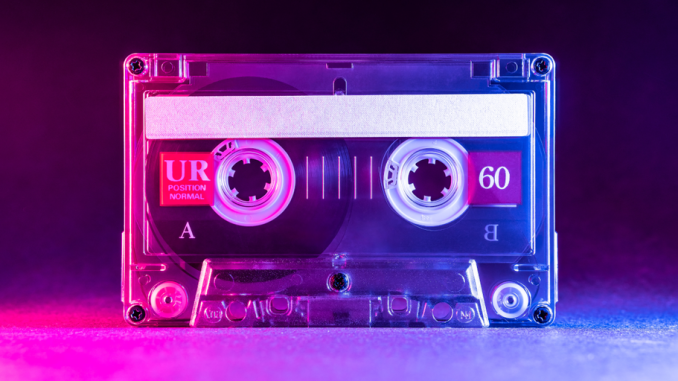
Crypto advocates see NFTs as a way to revitalize music ownership in the streaming era, and startup Vault is taking a particularly unique approach: using limited edition live concert recordings to revive the classic concept of “cassette culture,” and potentially benefit indie artists in the process.
Beginning this week, Vault’s “Cassette Culture 3.0” initiative is offering weekly drops of live recordings from underground and independent bands via its Solana-based NFT music platform. It’s designed to recall the approach by bands to create and distribute amateur recordings via cassette tapes to help build a following.
As it stands, 10 live recordings from bands performing at iconic New York venues including Baby’s All Right, Bowery Electric, and The Brooklyn Monarch are available to purchase as music NFT albums, with over 30 more artists already confirmed. Artists like Sid Simons, Sum Sun, and Charlotte Rose Benjamin are part of the initial lineup.
Today, we’re launching Cassette Culture 3.0, with exclusive live concert performances we recorded of up-and-coming musicians and bands across New York City’s most iconic venues, including Bowery Electric, The Bitter End, Baby’s All Right, Mercury Lounge, and many more. 🗽 pic.twitter.com/2Lbvc4yGt1
— Vault Music (@vaultmusichq) August 2, 2023
Owners can listen to the live albums via a dedicated mobile app. Typically, Vault sells each live album for between $5 and $10, with just 100 or 150 editions available for each drop thus far. Fans can purchase them using crypto or credit card, and will also get access to other features including performance videos and behind-the-scenes content.
Artists will receive 70% of the proceeds from each sale, with Vault covering minting costs, storage, and credit card fees. Vault also handles the actual recording and mixing of the live performance. The program will next expand into Nashville, and the company is also in talks with venues in London and Amsterdam too.
“There’s a real appetite from music fans to find out more about these grassroots scenes,” Vault CEO Nigel Eccles told Decrypt. “With a lot of these bands, they’re coming at it from a different path [than] a lot of TikTok artists. They don’t have many followers on Spotify or Instagram, but they can sell tickets in New York. Spotify doesn’t service these bands or movements, but we can.”
It comes as a new wave of bands are focusing on building up a live reputation before formally releasing music on streaming platforms. The London-based act The Last Dinner Party, for example, racked up tens of thousands of YouTube views on concert videos shot by fans, while live sessions filmed by Audiotree and NPR regularly reach thousands of people.
Brooklyn-based indie pop band Middle Part had a recent gig at Bowery Ballroom recorded by Vault for an upcoming Cassette Culture 3.0 release.
“The main thing I’m hoping for is that fans will get to collect a moment in time for Middle Part,” the band’s singer Andrew Selkōw told Decrypt. “I’m pumped to give fans a chance to experience our music outside of our studio recordings, digitally.”
While some prominent artists selling music NFTs via other platforms or methods—including Snoop Dogg, Justin “3LAU” Blau, and André “RAC” Anjos—are vocal advocates of crypto and blockchain tech, that’s not the case for Selkōw. He’s just excited about another opportunity to get Middle Part’s music out there.
“I personally don’t care about NFTs or the money, but I do appreciate what Vault is doing,” he added. “Illuminating a scene, with an opportunity to gain some capital and doing everything free of charge, is really big for an indie scene that’s otherwise pretty widely ignored.”
Elsewhere, the ongoing vinyl resurgence has shown Vault that fans care about music ownership, despite the abundance of content provided by streaming subscription giants like Spotify and Apple Music.
Blockchain builders see NFTs as a way to present true digital ownership for fans and collectors, fueling interest in rising platforms—including Sound, an Ethereum-centric music NFT platform that recently raised $20 million.
“The number one thing fans want from a band is access to music,” said Vault’s Eccles. “These unique recordings won’t be available anywhere else, and fans will own them forever.”
Vault has previously worked with high-profile artists like Fletcher on NFTs around her “Girl Of My Dreams” tour, but Cassette Culture 3.0 focuses on independent and underground artists. Many lesser-known artists make a pittance on streaming royalties, and typically rely on live shows to make a living—a framework recently threatened amid the COVID-19 pandemic.
“That’s key for us,” explained Eccles of the program’s indie-centric approach. “They’re the artists who need this the most. Twenty years ago with CDs, a lot more artists could have a full-time career just from selling music. That’s just not true today, because streaming kinda sucks for them. It only really works for the superstars.”
“We wanted to focus on the independent and underground artists because that’s who we can impact the most,” he continued. “It might only be a few thousand dollars, but actually—for a lot of these artists—that’s more than they’ve ever made from streaming.”
Cassette Culture 3.0 takes influence from the international music scene that flourished from the late 1970s to the early 1990s, which saw DIY musicians create tapes of home recordings to fund their career. That ethos continued via online platforms like SoundCloud and MySpace in the 2000s, but artists weren’t able to easily monetize their home recordings in the same way.
For the project, Vault has curated a range of bands that it believes represents just how exciting grassroots music scenes are, but bands can also put themselves forward for the project. Eccles hopes to incorporate more genres over time too, and sees the project as a way to potentially help artists break out and sustain themselves.
“This won’t replace streaming, but we want to complement it,” said Eccles. “We want to offer fans the opportunity to collect unique pieces, and we want artists to be able to make a living through their music.”




Be the first to comment